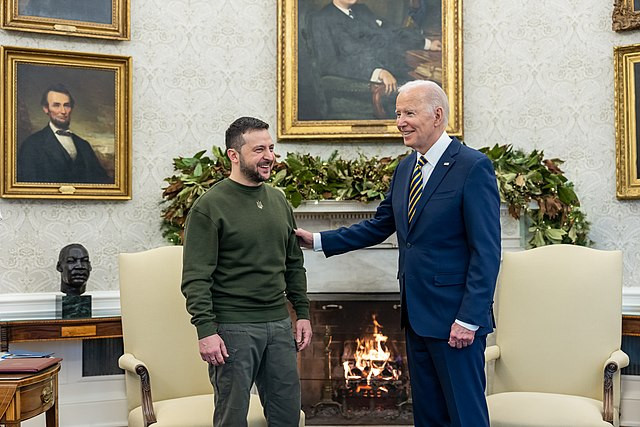President Joe Biden is spearheading a renewed drive among the world's leading democracies to solidify their support for Ukraine in its ongoing conflict with Russia. At the G7 summit in Italy, Biden met with Ukrainian President Volodymyr Zelensky to personally reinforce the West's commitment to Ukraine's sovereignty. This effort comes amid growing concerns about political stability both in the U.S. and Europe, particularly with the potential return of former President Donald Trump.
Biden's visit to Europe underscores his administration's proactive stance on the Ukraine crisis. Speaking at the Normandy battlefields last week, Biden emphasized the importance of continued support for Ukraine. "We will not walk away, because if we do, Ukraine will be subjugated, and it will not end there," Biden declared, surrounded by U.S. veterans and the graves of their fallen comrades. "Ukraine's neighbors will be threatened. All of Europe will be threatened. ... The autocrats of the world are watching closely to see what happens in Ukraine."
However, Biden's assurance faces skepticism due to uncertainties surrounding his political future. With Trump, a critic of NATO and admirer of Putin, possibly returning to power, there is anxiety over the U.S.'s long-term commitment to Ukraine. Trump's resurgence is evident as he maintains a stronghold on the Republican Party, despite recent legal troubles.
Biden's commitment to Ukraine is clear, but the durability of Western support is questioned. Political shifts in the U.S. and Europe, along with Putin's relentless military strategy, raise concerns about the West's endurance. Despite these challenges, Biden and his allies are making moves to secure Ukraine's position.
The G7 summit marks a series of significant initiatives:
- Sanctions on Russia: New sanctions targeting over 300 individuals and entities aim to cripple the Kremlin's war economy. Treasury Secretary Janet Yellen highlighted the measures designed to increase the cost of Russia's conflict, stating, "Every day, Russia continues to mortgage its future to sustain its unjust war of choice against Ukraine."
- Bilateral Security Pact: Biden and Zelensky are expected to sign a 10-year security agreement, committing the U.S. to train Ukrainian forces and enhance cooperation in armaments production. National Security Adviser Jake Sullivan emphasized the U.S.'s ongoing support, noting, "We want to demonstrate that the U.S. supports the people of Ukraine, that we stand with them, and that we'll continue to address their security needs not just tomorrow but out into the future."
- Economic Support Package: The G7 leaders are negotiating a $50 billion economic aid package for Ukraine, funded by the interest on frozen Russian assets. This initiative aims to rebuild Ukraine's infrastructure and strengthen its economy.
- NATO Support: A forthcoming NATO package will institutionalize military support for Ukraine, although it stops short of providing a clear timetable for Ukraine's NATO membership, a key aspiration of Zelensky.
These measures are critical as Ukraine faces significant challenges on the battlefield. A report from the Hudson Institute highlights Russia's incremental gains in eastern and northeastern Ukraine and the devastating impact on civilian infrastructure, raising concerns about the upcoming winter.
Retired Gen. Wesley Clark cautioned against underestimating Russia's military capabilities. "The Russian character, the Russian force is structured around grinding forward, grinding forward regardless of losses," Clark said. "Don't underestimate them. Technically, they're pretty smart. They've got China behind them; they've got Iran and sanctions-busting behind them."
The Western response to Ukraine's plight remains strong but is tested by geopolitical shifts. A new war following the Hamas terror attacks on Israel has also diverted attention, highlighting the complex global landscape. Zelensky's interactions with the West reflect a mix of gratitude and frustration, particularly regarding delays in aid delivery.




